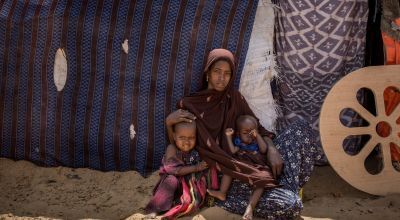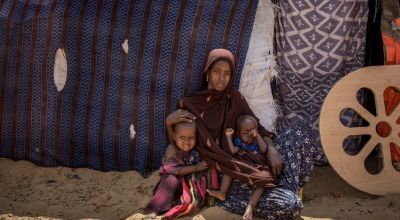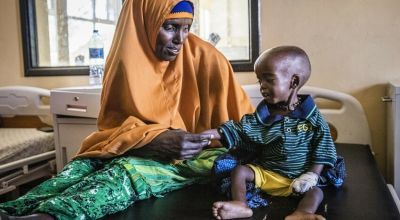
Read our 2023 annual report

Knowledge Hub
Baidoa is at the epicentre of the current drought and impending famine. The scale of the challenge facing humanitarian workers is overwhelming.
As the worst drought in 40 years takes an ever tightening grip on the city and surrounding region, more and more people arrive every day, in search of water and food. An estimated one thousand people a week are arriving into Baidoa’s sprawling displacement camps, which are home now to 700,000 people.
Almost half of those displaced people have arrived since January 2022. They come by donkey carts, trucks, or on foot, carrying their belongings for 100km or more with them. When I talk to them, they have just one goal — survival.
Nobody can recall a drought so intense or so devastating, and we’ve had many droughts here in Baidoa over the years. The worst in recent times was in 2011, which escalated into a famine that claimed at least 260,000 lives.
Everyone here agrees that this drought is worse. We have not received proper rain in Baidoa since April 2020. In 2011 some people managed to store food to help them through. This time, everyone’s reserves are empty.
In 2011, there were sporadic rains in some districts — enough to keep some pasturelands for animals. This year the drought is widespread, with shallow wells, lakes and reservoirs dry and even the mighty Juba River drying up at some point, which is historic. Only the deepest boreholes still have some water. While some animals survived in 2011, this drought is destroying herds and livelihoods.
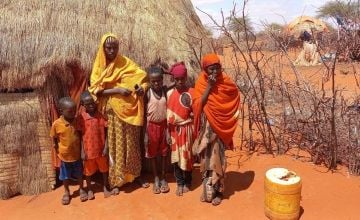
Securing enough water for Baidoa’s ever expanding population is one of the biggest challenges for humanitarian organisations and the local government. Concern is trucking water into the city from 15 kilometres outside the city. Trucks queue at boreholes for up to half a day to fill up.
Meeting the needs of the huge number of displaced people is the single greatest challenge we face every day. Demand outstrips supply for almost everything that is needed.
The city’s two stabilisation centres — where malnourished children with medical complications are referred to — are constantly full. The mobile clinics in the camps are incapable of meeting the massive demand. I visited a camp this week where an estimated 1,000 people turned up for the weekly clinic. Those queueing are desperate to get treatment and therapeutic food for their sick and malnourished children.
“My child died last month within the camp for internally displaced people due to measles but I was also not able to afford him something to eat and medication due to lack of money to buy them in order to save his life. Other children also died due to malnutrition," one widow told me during to a visit to a camp outside Baidoa.
Hunger is everywhere. The city’s streets are full of people begging. Some of the traders and the city’s residents give them what they can. The Islamic faith encourages people to extend a helping hand to the needy especially during such difficult times.
My child died last month within the camp for internally displaced people due to measles but I was also not able to afford him something to eat and medication due to lack of money to buy them in order to save his life
This humanitarian situation has been developing in Baidoa since 2017, with the number of displaced people growing since then. In the early years the city’s existing population could assist the new arrivals. But soaring food prices — fuelled by the Ukraine conflict — are undermining their ability to help, as they struggle themselves to make ends meet.
The price of a 50kg bag of sugar has jumped from US$25 to US$46 since January. Twenty litres of cooking oil has gone from US$20 (€20.18) to US$40 (€40.36). Fuel has trebled from US$0.50 (50c) to US$1.50 (€1.51) a litre and 25kg wheat flour from US$14.50 (€14.63) to US$20 (€20.18).
The crisis is further complicated by non-state armed groups which control areas in the region. They are blocking supplies to government controlled towns and demanding food and money from local communities in the areas they control. The fact that Baidoa is government controlled is one of the reasons so many people are coming here.
Regional insecurity is also hindering the humanitarian response to the crisis, with the UN and humanitarian organisations having to fly lifesaving supplies into the city.
With forecasts that the October to December rains will also fail and the next rainy season not being due until March 2023, the next six months will be very challenging in Baidoa. All the factors are negative.
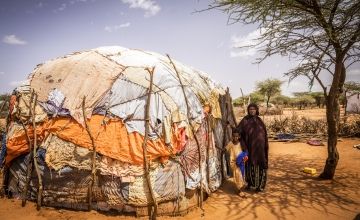
Concern’s team are working to help those most in need in city and surrounding region. Since January we have provided cash assistance to over 69,000 of the poorest people who have arrived in Baidoa.
Currently we are also providing water, hygiene and sanitation supports response as follows:
- Water trucking safe drinking water to displacement settlements;
- Construction and rehabilitation of wells and boreholes equipped with appropriate pumping and power systems, tanks and distribution networks;
- Construction of latrines (ordinary and for people with special needs);
- Distribution of hygiene and sanitation kits;
- Hygiene promotion through awareness raising by the trained community hygiene prompters.
There is a growing expectation that the technical criteria to declare a famine in the Bay region (where Baidoa is the main city) will be confirmed in the coming weeks and a regional famine will be declared. Those decisions are for people at a higher level and don’t get much attention among ordinary people in Baidoa, whose sole goal is survival.
But what is clear is that there is a critical need for a huge mobilisation of resources in the coming weeks and a meaningful intervention by the government and global donors if thousands of lives are to be saved.
All the indications are that the situation will get much worse in the coming months. Frontline humanitarian organisations like Concern Worldwide are here on the ground assisting people. But the needs greatly outstrip the available resources. With more resources we could help more people and save lives.
Kusow Kalmole is a humanitarian aid worker, based in Baidoa, Somalia, working for Concern Worldwide. His name has been changed for security reasons.



